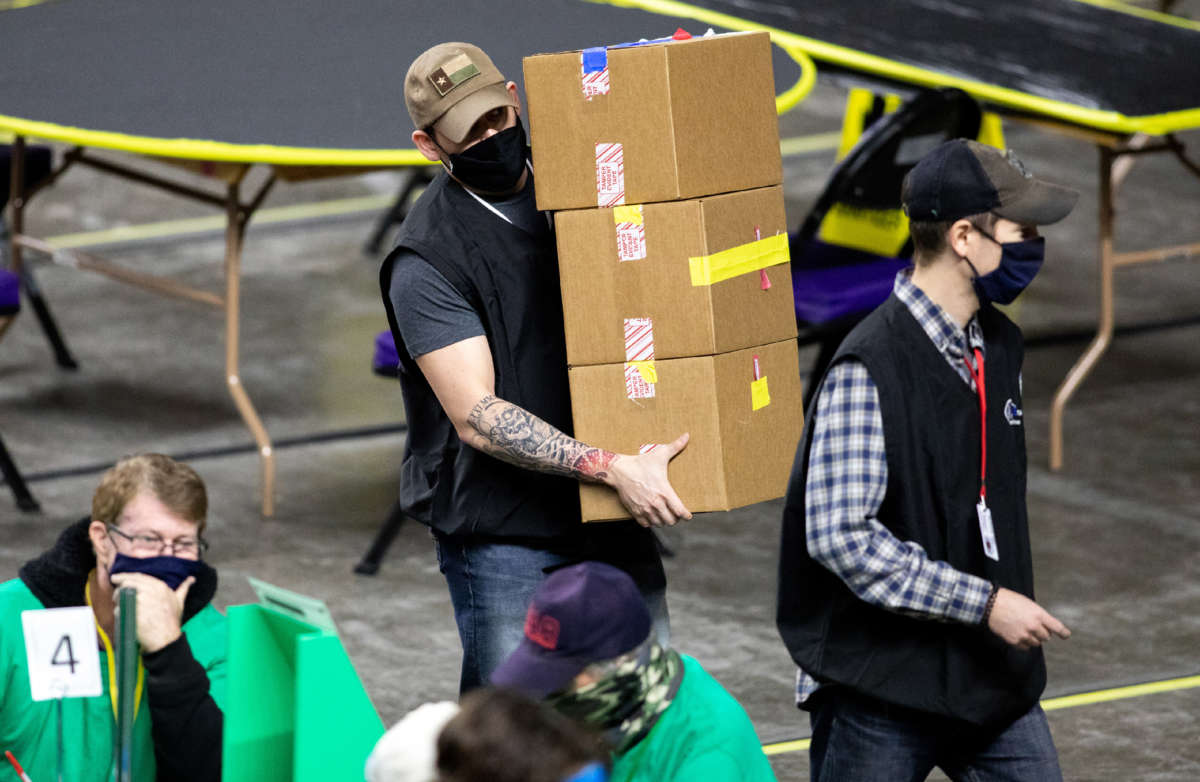Most in the U.S. question the legitimacy of so-called election “audits,” like the one happening in Maricopa County, Arizona, according to new polling from Monmouth University.
The poll asked respondents whether they felt audits of the 2020 presidential election, many of which are engaging in dubious activities, are “legitimate efforts to identify potential voting irregularities” or “partisan efforts to undermine valid election results.”
A majority of Americans, the poll found, felt the audits were partisan-based attempts to question the validity of the outcome of the presidential election, with 57 percent in the poll saying as much. Just one-third of respondents (33 percent) felt that the audits were legitimate actions intended to flesh out supposed voter or election fraud.
A plurality of respondents (40 percent) also said that these types of audits weaken democracy in the United States, while half that number (20 percent) said that they strengthen it. Thirty-five percent felt the audits had no impact one way or another.
On whether voter fraud itself was a widespread issue, only 37 percent in the poll said it was a “major problem.” Conversely, 50 percent of respondents said that voter disenfranchisement was the “major problem” — such as what’s occurring in a number of Republican-led states where bills intended to make voting more difficult have been introduced or passed.
There are plenty of reasons why voters might be skeptical of these so-called audits. The recounting and examination of ballots in Maricopa County, the most infamous audit currently being carried out, is managed by a security firm called Cyber Ninjas, which has zero experience conducting such election audits. The process has been rife with problems, with auditors at one point claiming that election data had been deleted by county officials before being handed over to them — when the real issue was one of competence, with the “auditors” themselves not knowing where such files typically resided and looking for them in the wrong places.
The company has subjected ballots to questionable examination processes, too, which may have actually damaged their integrity, and have failed to properly secure ballots, possibly in violation of federal law.
In the latest news regarding that audit, voting system data has been transported to a cabin in Bigfork, Montana, where the information will ostensibly be examined further. However, no details have been provided on what security measures are being taken to protect the election data.
In spite of the numerous missteps and embarrassing actions in Maricopa County, Republican lawmakers from various locations across the country have said that they may also conduct similar audits.
Pennsylvania Republican lawmakers traveled to the audit site in Arizona to see firsthand what was happening, and have signaled that they may soon begin their own audit as well. Wisconsin Republicans have also hired three former police officers, one of whom has conducted a dubious audit in the past (and whose evidence was thrown out of court proceedings after being deemed unreliable), to follow-up on supposed election fraud claims in that state, although no evidence of any kind of fraud whatsoever actually exists, elections officials have pointed out.
Such audits, despite being untrustworthy in many people’s eyes, could be used by Republicans to push for more restrictive voting measures in state legislatures across the country. But most in the U.S. want voting to become easier, not more difficult.
The same Monmouth University poll that asked about audits also queried respondents on election reforms. On voting by mail, 50 percent of respondents in the poll said the process should be easier, versus 39 percent who said it should be harder. Seventy-one percent of respondents also said that in-person early voting should be made easier, while only 16 percent said it should be more difficult. And when asked whether there should be national guidelines to allow mail-in voting and in-person voting in every state, 69 percent said they would support the idea, with only 25 percent opposed.
Speaking against the authoritarian crackdown
In the midst of a nationwide attack on civil liberties, Truthout urgently needs your help.
Journalism is a critical tool in the fight against Trump and his extremist agenda. The right wing knows this — that’s why they’ve taken over many legacy media publications.
But we won’t let truth be replaced by propaganda. As the Trump administration works to silence dissent, please support nonprofit independent journalism. Truthout is almost entirely funded by individual giving, so a one-time or monthly donation goes a long way. Click below to sustain our work.
